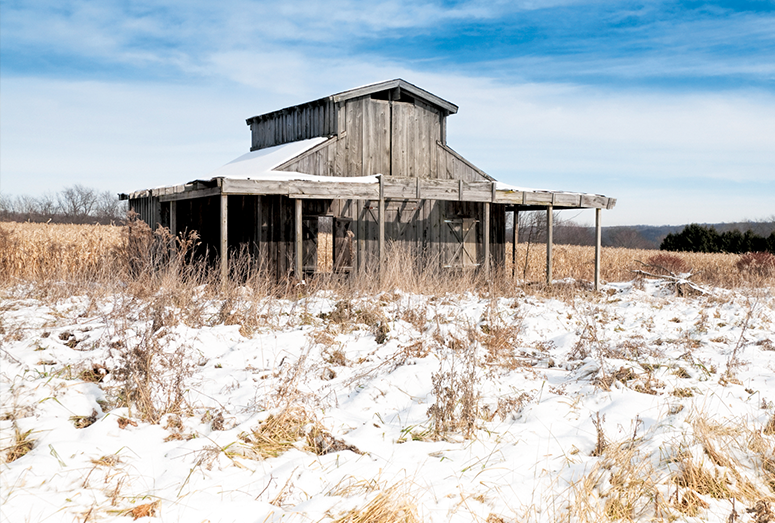Tuning into Childhood
Musician, tunesmith, and pied piper, Justin Roberts ’92 enchants children and hooks their parents.
Read The StoryProfessor of Sociology Howard Sacks finds fulfillment along the journey from Philly to farm.

I’m an unlikely candidate for a farmer. Raised in a working-class Philadelphia suburb, I had my closest brush with agriculture, before arriving in Gambier, jockeying the family push mower across our postage-stamp-sized yard. But my active engagement with Knox County’s rural life prompted me to take up part-time farming. In the process I’ve learned some valuable lessons quite different from those I’ve acquired in twenty years of formal education and four decades as a teacher-scholar.
Consider the way we think about time. How long does it take to move a flock of sheep from one pasture to another? The answer is, it takes as long as it takes. Sometimes I can do it in a few minutes; other times, it takes much longer. How long it takes depends as much on the mood of the sheep as it does on anything I do. The point is that in what I call “chore time,” the task determines how much time you devote to it.
Not so with “appointment calendar time,” which rules most of us in our usual daily life. Here we impose an arbitrary grid of hour or half-hour segments, and we fit our tasks to fill them. So, for example, “This is a very interesting discussion, but, unfortunately, class has come to an end.” Or, “I think you’ve made an important emotional breakthrough. But our hour is up, so think about it until next week’s session.”
I think appointment calendar time is inherently less fulfilling than chore time because it works against the meaningful completion of one’s labor. To conduct business in so many little segments disrupts the flow of an integrated life.
I enjoy farm chores. Mowing a pasture on a warm June evening or stacking firewood on a crisp October weekend brings me pleasures largely absent from my Kenyon responsibilities. A sense of grounded-ness issues from doing tasks tied to the seasons and to the land. And unlike my academic work, where there’s always a new book to read or another draft of that paper I could do, chores offer an unmistakable sense of closure. When the pasture is mowed or the firewood stacked, there’s nothing more to accomplish. These experiences mix with my own physical exhaustion to create a deep satisfaction quite unlike working out in the gym.
I often find myself lingering after the chore is done, to admire my handiwork. A barn loft filled with fresh-cut hay offers a pleasant, earthy smell and a comforting sense of security against the vagaries of winter. Shoveling manure out of the barn—despite the sometimes disagreeable odor—ensures a rich stash of fertilizer to make next summer’s garden grow. There’s beauty to behold in a woodpile stacked with care.
On the farm I’m constantly aware of my status as a minority species. My wife, Judy, and I interact daily with two farm dogs, an assortment of barn cats, and a dozen or so sheep and goats. The high-pitched call of peepers from our wetland each March reminds us that we’ll be overrun by frogs of all colors and sizes throughout the summer months. Sitting on our porch at twilight on a summer evening, we watch the procession of flying things, bats replacing the barn swallows, darting high among the maple trees. On autumn nights, herds of deer use our hayfield as a grassy superhighway. They’ve learned just how far back from the house they must roam to avoid the dogs’ attention.
In the urban world, it’s easy to become convinced that humans populate the planet to the near exclusion of other species. Suburban developments ironically memorialize the biodiversity they’ve in fact destroyed, with names like Wolf Ridge and Forest Glen. We’re seduced into thinking that humans are preeminently in charge, an idea contributing to both a sense of self-importance and continual stress. Think how quickly we reach for the latest herbicide to eradicate that predatory dandelion spoiling our well-manicured yards.
But on the farm I need only awaken to discover that coyotes have invaded the north pasture overnight and killed two lambs to realize the limits of my control. I am only one participant in a complex drama that constitutes life on the farm. As a discipline, farming keeps me mindful of my place and of my deep and multifaceted connection to my surroundings.
Musician, tunesmith, and pied piper, Justin Roberts ’92 enchants children and hooks their parents.
Read The StoryPhilander’s Phebruary Phling brought the heat to thaw the winter blues and, for over two decades, took its place…
Read The StorySabbaticals for a semester or a year keep Kenyon’s tenured faculty energized, engaged, and immersed in their…
Read The Story